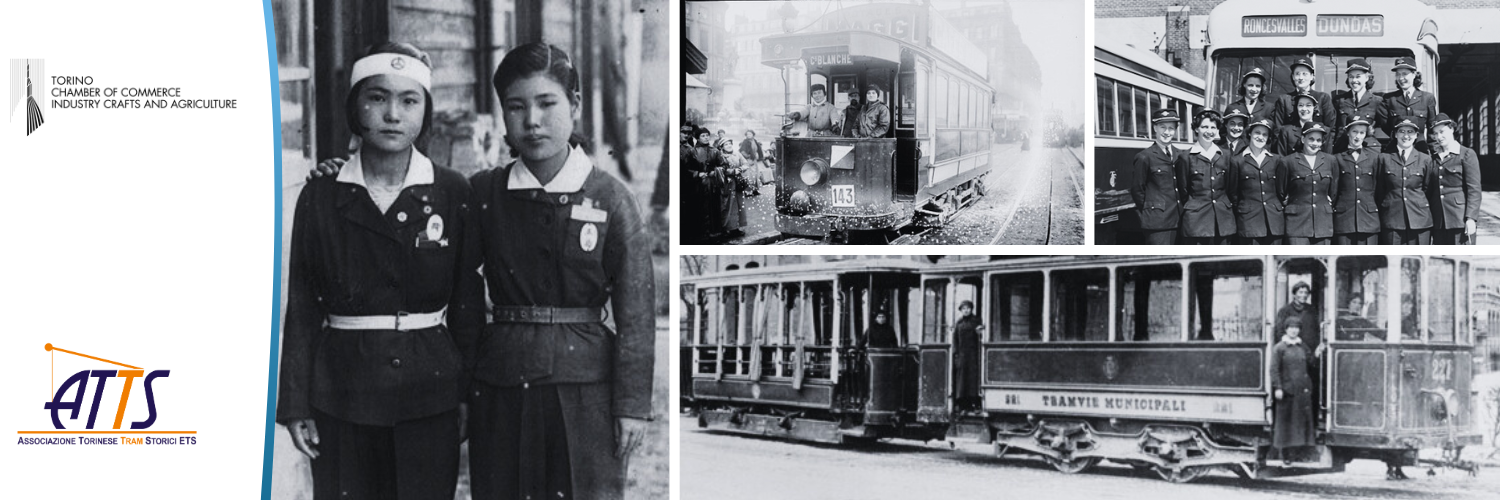
- Network partners
- Sector group
-
Tourism and Cultural Heritage
- Countries
-
ITALY
At the beginning of August 1945, the Japanese city of Hiroshima lay in ruins. It had just been hit by the first atomic bomb ever used in war, killing tens of thousands. In the midst of the chaos, a tram slowly moved through the ruined buildings. On board a young girl was working.
Women working on tramways at the time were a rare sight, not just in Japan but across the world. Necessity during wartime pushed these women into the workforce. The girl on the tram ended up becoming a symbol of Hiroshima’s recovery and is still used in peace education today.
This is just one story encountered by the volunteer research Team of the Associazione Torinese Tram Storici (ATTS). The association studies and maintains the history of the tramways of Turin, in Italy. A few years ago, some ATTS researchers started getting interested in the role of women on trams during the First and Second World Wars.
"Women played a crucial role during the two world wars, since they ensured tramways in Turin were in service without interruption," said the ATTS research Team. "This was often a source of scandal. People were not used to seeing women do these jobs. But at the same time, it caused a degree of pride, empowerment and success for these women. They provided essential support for the economy and transport around the city during difficult times."
From tram to senate
Inspired by the stories unearthed in Turin, the ATTS volunteers wondered whether similar arrangements also took place in other countries. With the help of the Enterprise Europe Network, other historical associations across the world responded to their call.
"The response was enormous," they said. "We managed to connect with people in countries that range from Chile to Japan. All of them noticed similar patterns in their history."
The first reaction came from Belgium. The Flemish Museum of Tramways started to research how women entered the tram workforce during World War II in the City of Ghent.
One of them was Georgia Turf-Demunter. She started working in 1943 for the tramways, checking tickets, but also had to periodically leap out of the tram to adjust the rails and steer the tram across the right track, a physically demanding job. After the war, Turf-Demunter would end up becoming a Belgian Senator, serving between 1973 and 1974 and again between 1977 and 1981.
Another story, from 1940s San Francisco, showed how an African American girl broke gender and racial prejudices, working as a ticket collector on trams. She would later become an activist in the civil rights struggle.
"Doubts about women's abilities were the norm, men did not recognise women’s skills and abilities in managing work, home and children together," said the researchers of Turin.
Pay inequality always an issue
These international insights could not have been gathered without the involvement of the Enterprise Europe Network, according to the ATTS research Team. This was not, however, the first time the two organisations had crossed paths. ATTS got in contact with the Torino Chamber of commerce, the local member of the Entreprise Europe Network, at the end of 2023 for assistance in enhancing its digitalisation. Afterwards, ATTS contacted them again to request advice and assistance for the project on women’s role in tramways.
"ATTS was interested in understanding when and why the first women started driving trams or working as ticket collectors," said Paola Tolin of the Torino Chamber of commerce. "This is not just relevant from a societal point of view; this is a history that deserves to be known. It is also key for tourism in our city."
Even though this wartime experience empowered these women, it did not last very long. Once war ended, men returned from the front, and women left their newfound jobs. In Italy, for example, the researchers mention that most female personnel were either fired or relegated to secondary roles after both world wars.
A similar pattern emerged after World War II in the UK. In Glasgow, for example, women had taken positions driving and ticketing in trams during the war. This continued to cause controversy, even after the conflict ended. In the 1950s, the general manager of the Glasgow tramways mentioned to the press that women drivers were more attentive and reliable. After heavy protest by male-dominated trade unions, he was forced to retract these statements.
In the meantime, the Turin project continues to unearth new stories from the past. Researchers are investigating broader time periods and regions, while accessing previously unexplored archives, such as those of professional organisations and unions.
"A next topic of study will be the differences in pay between men and women on the tramways," said the ATTS researchers. "That is a very newsworthy subject, because inequality of pay is still a problem today."